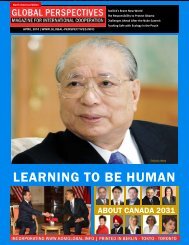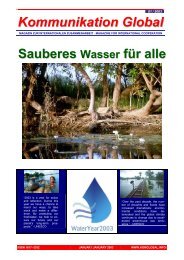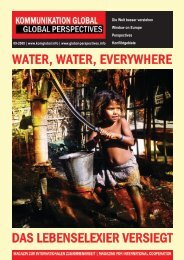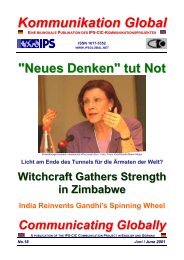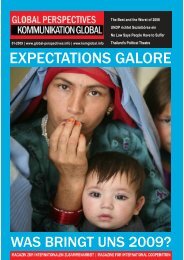GLOBAL PERSPECTIVES | Second Quarterly 2013 â North America ...
GLOBAL PERSPECTIVES | Second Quarterly 2013 â North America ...
GLOBAL PERSPECTIVES | Second Quarterly 2013 â North America ...
Create successful ePaper yourself
Turn your PDF publications into a flip-book with our unique Google optimized e-Paper software.
<strong>GLOBAL</strong> <strong>PERSPECTIVES</strong> - SECOND QUARTERLY <strong>2013</strong><br />
<strong>PERSPECTIVES</strong><br />
Genuine Democracy Needs Responsible Media<br />
By Ramesh Jaura<br />
BERLIN - When Erik Bettermann, the outgoing director-general of the German international broadcaster<br />
Deutsche Welle, launched the Global Media Forum in 2008, he had an ambitious aim: to institute a 'media Davos'<br />
on the banks of the river Rhine. The recently concluded sixth Forum has indeed achieved that aim. It imbibed the<br />
essential spirit of the World Economic Forum in the Swiss Alps and manifested alternative approaches guiding<br />
the World Social Forum.<br />
More than 2,500 participants comprising representatives<br />
of mainstream, government controlled, alternative and<br />
social media as well as non-governmental organisations<br />
(NGOs) and academia from over 100 countries attended<br />
the three-day conference from June 17 to 19, <strong>2013</strong> in the<br />
post-war historic city of Bonn and exchanged views on 'The<br />
Future of Growth - Economic Values and the Media' in<br />
some 50 workshops. They agreed that citizens are the key<br />
drivers of change, and that the media must build up an<br />
informed citizenry without which democracy would remain<br />
a farce.<br />
Such a threat is real – also in western democracies. A case<br />
in point is the “really existing capitalist democracy<br />
(RECD),” as eminent <strong>America</strong>n philosopher and linguist<br />
Noam Chomsky describes the U.S. political system. Any<br />
resemblance to the word "wrecked" is accidental, he jokes<br />
about the acronym. The "soaring rhetoric of the Obama<br />
variety", such as, "government of, for and by the people", is<br />
far from the reality of RECD, Professor Chomsky argued in<br />
a keynote address at an opening session of the Global Media<br />
Forum.<br />
Seventy percent of <strong>America</strong>'s population has no influence<br />
on policy. It is just a tenth of the top one percent who actually<br />
determine what policy should be. "The proper term for<br />
that is not democracy, it's plutocracy," Chomsky said.<br />
Asked about the role of the press, Chomsky simply replied<br />
concluding his keynote address on the opening day: “I<br />
would like the press to tell the truth about what matters."<br />
The significance of this simple remark is underlined by the<br />
fact that the inequalities of everyday life on the national<br />
agenda, influence reporting, public perception and language<br />
itself.<br />
India’s environmental activist Vandana Shiva’s keynote<br />
address on the closing day of the conference was another<br />
highlight of the Forum. "The future of growth as GDP<br />
(Gross Domestic Product) and commodification of the<br />
planet and society will inevitably accelerate ecological and<br />
social disintegration and the rise of a surveillance state,"<br />
she said. "We need to focus on the growth of wellbeing of<br />
the planet and the people for the sake of peace, justice and<br />
sustainability," the winner of The Right Livelihood Award<br />
said. The concept of GDP as a measure of economic growth<br />
and human progress was challenged in different workshops<br />
during the conference. ‘Sustainable growth’, ‘Sustainable<br />
economy’,<br />
‘Green economy’, ‘Beyond<br />
GDP’ ‘Goodbye<br />
GDP, Hello GDW (Wellbeing)’<br />
were recommended<br />
as some of the<br />
alternative concepts on<br />
the anvil to replace the<br />
GDP paradigm.<br />
Beyond GDP<br />
There have been signs of a paradigm shift since 1990 when<br />
the United Nations Development Programme (UNDP) first<br />
published the Human Development Index (HDI) – a composite<br />
measure of health, education and income. It was introduced<br />
in the first Human Development Report in 1990 as<br />
an alternative to purely economic assessments of national<br />
progress, such as GDP growth.<br />
Participants in a workshop hosted by the United Nations<br />
University pointed out that the congruence of unprecedented<br />
economic, social and environmental crises call for a<br />
revaluation of present measures of progress. It was argued<br />
that current indicators, such as GDP and the HDI, are insufficient<br />
to provide robust indication of societal progress.<br />
They fail, for instance, to inform on distributional aspects<br />
of economic growth; to reflect the state of natural resources;<br />
and to indicate whether national policies are sustainable<br />
in the long run. In this context, the workshop discussed<br />
new indicators of societal progress based on three<br />
international initiatives:<br />
-- The Inclusive Growth Project, which works towards<br />
achieving material progress through economic growth<br />
while encompassing equity, equal opportunity to basic<br />
service provision, and social protection for the most vulnerable<br />
people of the society.<br />
-- The Inclusive Wealth Report 2012 (IWR 2012) that presents<br />
a promising economic yardstick, the Inclusive Wealth<br />
Index (IWI). Grounded in theory and research, the IWR<br />
2012 proposes a radical shift in the way we measure economic<br />
progress: switching the analysis from ‘flows’ (like<br />
GDP) to ‘stocks’ of capital assets (or wealth). In the report,<br />
the wealth of nations is evaluated in an inclusive way by<br />
considering not only manufactured capital, but also human<br />
and natural capital. <br />
- 11 -




